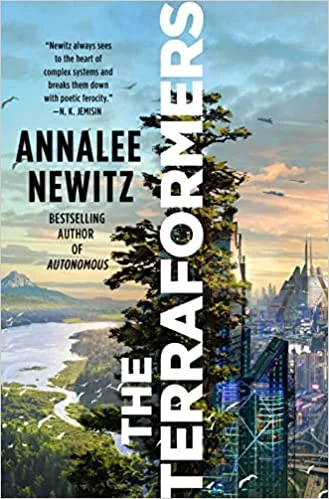
In her acknowledgements at the end of "The Terraformers" author Annalee Newitz says, "I wrote this book because I wanted to dream up a more hopeful world." While it is easy to identify the improved aspects of this future world, I was more struck by the ways that human flaws limit our ability to be the people we aspire to be.
The novel is divided into three parts; the first takes place in the year 59,006, the second in 59,706 and the third in 60,610 and all three are set on the privately owned planet Sask-E which is being carefully transformed over the centuries by a planet terraforming corporation called Verdance to be Pleistocene-like. In this future, everyone is sensitive to environmental protection. "Leave no trace" is the guiding principal of most people and of planetary development. Respect for fluid gender norms is the rule in this future as is the recognition of personhood for various animal species and sentient machines. And yet, the people working for Verdance (who are designed and decanted not born biologically) are considered to be owned by the company. In each section of the novel, there is a struggle between the off-world corporations and the workers they try to exploit. There is also a continuing struggle to define who qualifies as a "person".
Newitz' world building is fascinating, but their characters are strangely two dimensional. Whether that is because most characters appear only in a single novella-length part or because most are not simple homo sapiens a reader might identify with, is hard to say. "Terraformers" is also lacking a strong plot. The three parts of the book are separated by centuries and the three narratives are only held together by the common struggle between workers and corporations. That said, I was fascinated by this vision of the future where we respect our world and all the living elements it contains. Of particular interest is the question of which life forms rise to the level of personhood. At a point in history where we now discuss artificial intelligence and worry about whether a machine might ever become a self-aware sentient life form it is timely to discuss how we define "person". A flawed but interesting read.
 Skip to main content
Skip to main content


